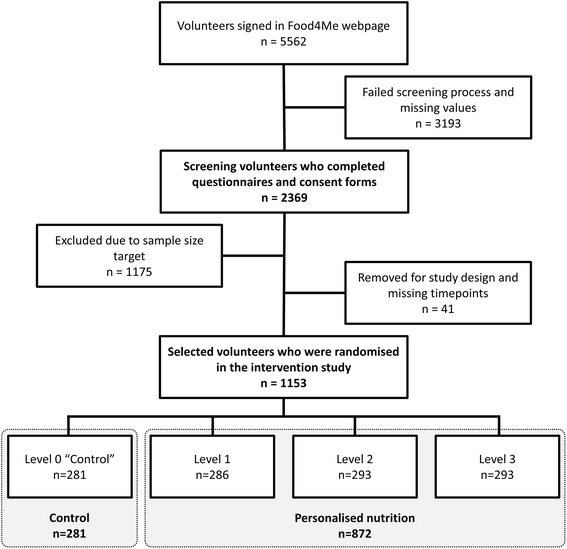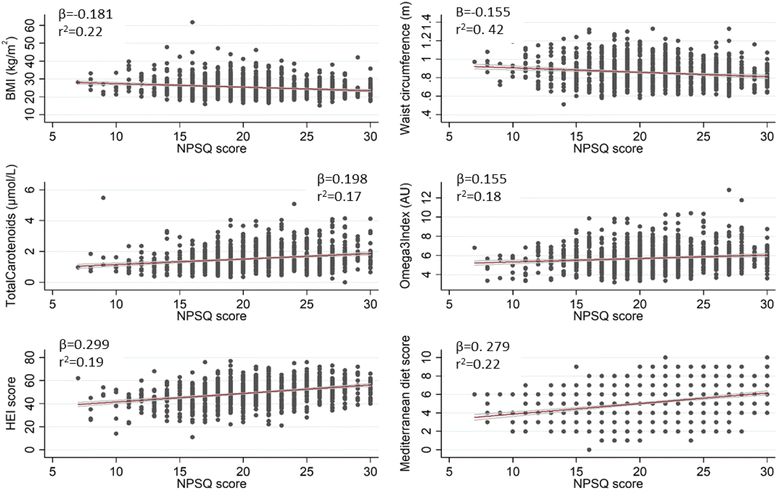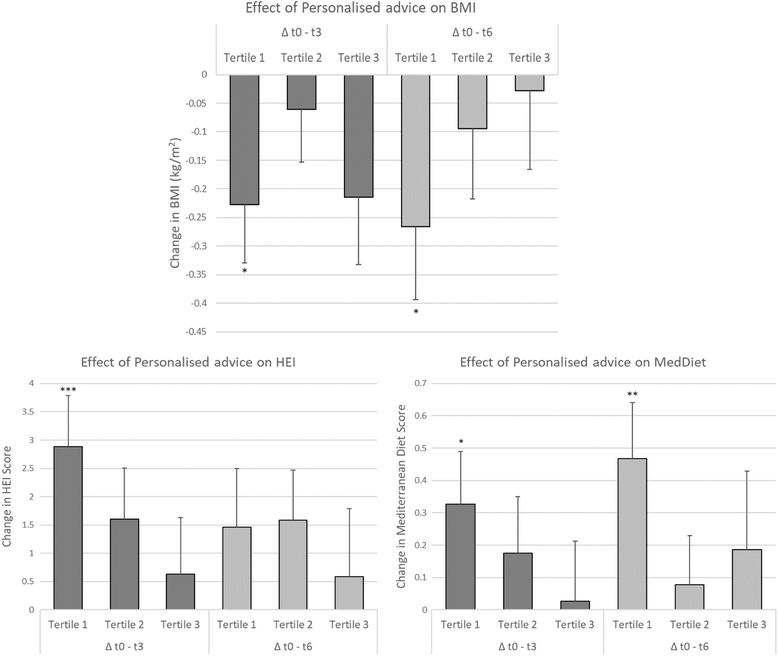Capturing health and eating status through a nutritional perception screening questionnaire (NPSQ9) in a randomised internet-based personalised nutrition intervention: the Food4Me study
- PMID: 29228998
- PMCID: PMC5725967
- DOI: 10.1186/s12966-017-0624-6
Capturing health and eating status through a nutritional perception screening questionnaire (NPSQ9) in a randomised internet-based personalised nutrition intervention: the Food4Me study
Abstract
Background: National guidelines emphasize healthy eating to promote wellbeing and prevention of non-communicable diseases. The perceived healthiness of food is determined by many factors affecting food intake. A positive perception of healthy eating has been shown to be associated with greater diet quality. Internet-based methodologies allow contact with large populations. Our present study aims to design and evaluate a short nutritional perception questionnaire, to be used as a screening tool for assessing nutritional status, and to predict an optimal level of personalisation in nutritional advice delivered via the Internet.
Methods: Data from all participants who were screened and then enrolled into the Food4Me proof-of-principle study (n = 2369) were used to determine the optimal items for inclusion in a novel screening tool, the Nutritional Perception Screening Questionnaire-9 (NPSQ9). Exploratory and confirmatory factor analyses were performed on anthropometric and biochemical data and on dietary indices acquired from participants who had completed the Food4Me dietary intervention (n = 1153). Baseline and intervention data were analysed using linear regression and linear mixed regression, respectively.
Results: A final model with 9 NPSQ items was validated against the dietary intervention data. NPSQ9 scores were inversely associated with BMI (β = -0.181, p < 0.001) and waist circumference (Β = -0.155, p < 0.001), and positively associated with total carotenoids (β = 0.198, p < 0.001), omega-3 fatty acid index (β = 0.155, p < 0.001), Healthy Eating Index (HEI) (β = 0.299, p < 0.001) and Mediterranean Diet Score (MDS) (β = 0. 279, p < 0.001). Findings from the longitudinal intervention study showed a greater reduction in BMI and improved dietary indices among participants with lower NPSQ9 scores.
Conclusions: Healthy eating perceptions and dietary habits captured by the NPSQ9 score, based on nine questionnaire items, were associated with reduced body weight and improved diet quality. Likewise, participants with a lower score achieved greater health improvements than those with higher scores, in response to personalised advice, suggesting that NPSQ9 may be used for early evaluation of nutritional status and to tailor nutritional advice.
Trial registration: NCT01530139 .
Keywords: Food4Me; Healthy eating index; Mediterranean diet score; NPSQ9; Nutritional status; Personalised nutrition; Survey.
Conflict of interest statement
Ethics approval and consent to participate
All procedures performed in the study were in accordance with the ethical standards of the corresponding research committees of each of the seven participating centres, and with the 1964 Helsinki declaration and its later amendments or comparable ethical standards.
Informed consent was obtained from all individual participants included in the study.
The Research Ethics Committees evaluating the study protocol were those with the appropriate authority in each study site: University College Dublin, Ireland; University of Maastricht, Netherlands; Universidad de Navarra, Spain; Harokopio University, Greece; The University of Reading, United Kingdom; National Food and Nutrition Institute, Poland; Technische Universitaet Muenchen, German.
Being the study coordinator Ireland, the relevant Health Authority in Food4Me study was the Research Ethics Committee of Ireland.
Consent for publication
Not applicable
Competing interests
CAD is cofounder, board member, stock-owner and consultant for Vitas Ltd. (
Publisher’s Note
Springer Nature remains neutral with regard to jurisdictional claims in published maps and institutional affiliations.
Figures



References
-
- European Parliament, Council Corrigendum to regulation (EC) No 1924/2006 of the European Parliament and of the council of 20 December 2006 on nutrition and health claims made on foods. Off J Eur Union. 2007;12:16.
Publication types
MeSH terms
Associated data
LinkOut - more resources
Full Text Sources
Other Literature Sources
Medical
Research Materials
Miscellaneous

